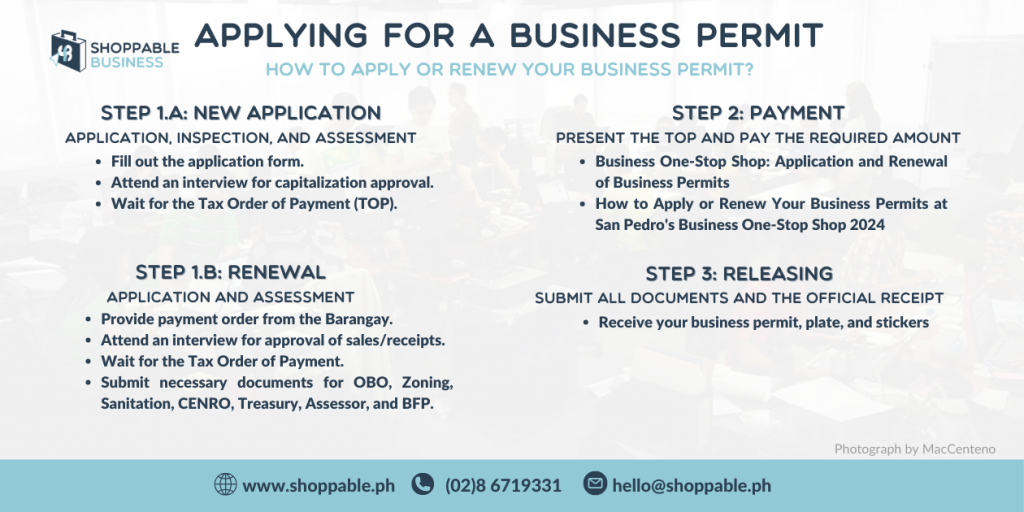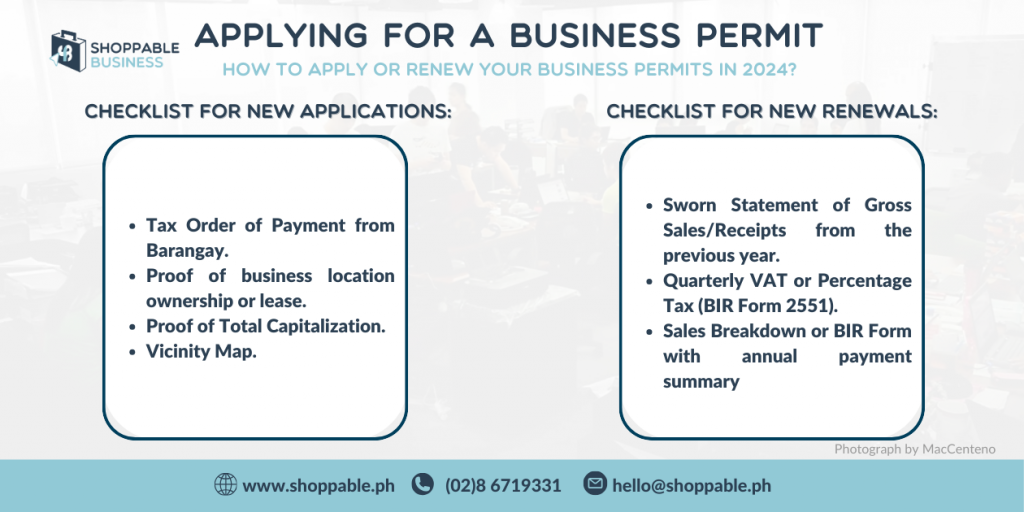Starting or maintaining a business often involves securing a variety of licenses and permits, one of the most crucial being a business permit. A business permit authorizes your company to operate legally within a particular jurisdiction and is typically issued by the local government. This article will walk you through the steps to apply for or renew a business permit, ensuring compliance and helping you avoid any delays or complications.
Whether you’re applying for a new permit or renewing an existing one, here’s a detailed breakdown of the process in three main stages: application and assessment, payment, and release.

STEP 1: Application and Assessment
The application and assessment stage is the first and one of the most comprehensive parts of obtaining a business permit. It involves different steps depending on whether you’re applying for a new permit or renewing an existing one.
Step 1A: New Application
If you’re applying for a business permit for the first time, you’ll need to follow these steps:
- Fill Out the Application Form: Begin by obtaining and filling out the business permit application form. This document typically requires details about your business, such as its name, address, nature, ownership structure, and other relevant information. Accuracy is crucial, as errors or omissions could delay processing.
- Attend an Interview for Capitalization Approval: Some local government units (LGUs) require an interview or a brief meeting to assess the capitalization of the business. This interview may involve discussions on your business’s financial structure, projected revenue, and initial investment. The purpose is to ensure your business has the necessary resources to operate and grow.
- Wait for the Tax Order of Payment (TOP): After completing the application form and interview, you will be issued a Tax Order of Payment (TOP). The TOP outlines the taxes and fees you must pay to secure your business permit. These charges vary depending on factors like business type, location, and capitalization. The document typically includes due dates, so be sure to review it carefully.
Step 1B: Renewal
Renewing a business permit is somewhat similar to applying for a new one but includes additional steps to verify ongoing compliance and update any relevant details. Here’s what you need to do:
- Provide Payment Order from the Barangay: When renewing, start by obtaining a payment order from the barangay (the smallest administrative division in the Philippines). This document certifies that your business complies with barangay regulations and is eligible for renewal.
- Attend an Interview for Approval of Sales/Receipts: Renewal applications may require you to provide information on your business’s annual revenue and sales. In some cases, this involves an interview to verify the accuracy of your sales reports and ensure that tax payments align with your income.
- Wait for the Tax Order of Payment: Just like a new application, renewals involve receiving a Tax Order of Payment that lists the required fees. The TOP must be paid promptly to avoid late fees or delays in processing.
- Submit Necessary Documents for Approval: Finally, renewal requires submitting various documents to different municipal offices, including the Office of the Building Official (OBO), Zoning Office, Sanitation Office, City Environment and Natural Resources Office (CENRO), Treasury, Assessor’s Office, and Bureau of Fire Protection (BFP). Each of these offices may have specific requirements, ensuring that your business complies with local laws and standards.
Keep in mind It’s essential to organize and keep track of all documents, as each one is necessary for the smooth completion of the renewal process. Missing paperwork or miscommunication with these offices can lead to delays.
Step 2: Payment
Once you’ve completed the application or renewal process and received the TOP, the next step is making the required payment. Here’s how to navigate this stage:
- Present the TOP and Pay the Required Amount: Take the Tax Order of Payment to the designated payment center. Depending on your location, this could be at a Business One-Stop Shop, city hall, or another authorized payment location. The amount you’ll need to pay will depend on various factors, including business type, size, location, and other local considerations.
- Understand Business One-Stop Shop Services: Many local government units offer a “Business One-Stop Shop” during peak periods, such as the start of the year when most businesses renew permits. This one-stop shop allows business owners to handle various procedures, including payment, in one location, significantly simplifying the process. It’s especially convenient for those applying for or renewing permits in busy areas or municipalities with high application volumes.
- Refer to Local Guidelines for Payments and Documentation: Every city or municipality may have unique guidelines for applying for and renewing business permits. For example, cities may offer specific instructions on where and when to pay during designated business days. Make sure to familiarize yourself with your LGU’s requirements by visiting their website or contacting their office.
Keep in mind: Timely payment is essential for both new applications and renewals. Some localities impose penalties on late payments, so it’s advisable to pay as soon as you receive the TOP.
Step 3: Releasing
After submitting all documents and making the necessary payments, the final step is permit release. In this stage, you’ll complete the process and receive your permit, allowing you to legally operate your business.
- Submit All Documents and the Official Receipt: After making the payment, take the official receipt and all required documents to the designated releasing office. The officials there will review your documents to ensure everything is in order before issuing your permit.
- Receive Your Business Permit, Plate, and Stickers: Once everything is verified, you’ll be given your business permit, a plate (usually displayed on the business premises), and any required stickers that show your business complies with local regulations.
- Business Permit: This is your primary authorization to operate. It should be displayed prominently at your place of business.
- Plate: Some LGUs provide a business plate that displays the permit’s validity period, typically one year.
- Stickers: In some areas, specific stickers are issued, which are affixed to the business plate or displayed on your business premises. These stickers are another sign that you’re complying with local business regulations.
- Confirm the Expiration Date for Future Renewal: Business permits are generally valid for one year and must be renewed before expiration to avoid penalties. Be proactive in tracking expiration dates, and start the renewal process early, as delays can occur if many businesses apply simultaneously. Setting reminders or using software can help ensure you don’t miss renewal deadlines.
Keep in mind: The final release stage is straightforward if all previous steps are completed accurately. However, missing documents or unpaid fees can cause delays, so ensure all steps are completed and verified.

Tips for a Smooth Business Permit Application or Renewal Process
- Stay Organized: The application and renewal process involves numerous documents and steps. Keeping everything organized, perhaps in a checklist format, can save time and reduce stress.
- Be Proactive with Compliance: Ensure that your business complies with all requirements from various municipal offices such as zoning, sanitation, and environmental standards. Non-compliance can lead to delays or even permit denial.
- Know the Correct Terminologies and Documentation: If your LGU offers a guide to application, make sure to be familiar with the correct documents for your business. These facilities streamline the application and renewal process by consolidating multiple steps in one location.
- Prepare Financial Records: Many LGUs require financial records, particularly for renewals. Having updated, accurate financial records can expedite the process.
- Engage with Local Government Representatives: Developing a good rapport with local officials or attending seminars on business registration can provide insights and make the process smoother.
Reminders
Securing a business permit is an essential step for any business. It not only ensures legal compliance but also instills trust with customers and partners, as it demonstrates your commitment to operating responsibly. By following these steps and staying organized, you can streamline the application or renewal process, avoid common pitfalls, and focus on what really matters, growing your business.









